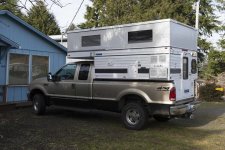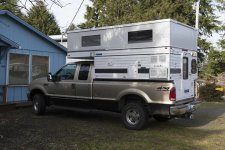ssobol":fodabjce said:
I have wanted to get a RV based on the Sprinter van chassis. This would make a good combination with a C-Dory IMO. With the diesel engine it should have not problem towing a CD-22.
I have not checked on the "pure vans," but on many of the smaller Sprinter-based RV's, they are not rated to tow over 3,500# until you get into the very newest ones, which I think may be 5,000# (but I'm not sure). Something to check anyway.
I tow with a camper van (Class B van), and I think it makes a fantastic C-Dory tow machine. I had to choose a tow vehicle when I got my 22, as I had nothing suitable. I considered pickup trucks (with or without campers), SUV's, Class C's.... you name it. After a lot of thinking and looking, I ended up with a 3/4-ton Class B van (not a Road Trek, but reasonably similar). And am I ever glad I did. There really hasn't been any time I wish I had one of the other smaller rigs (such as a pickup truck or SUV).
At first I thought "Oh, the gas mileage is going to be awful." But then as I read many towing threads, I found that no matter what people got when not towing, it was nearly always "12" when towing (except for certain diesel pickups, but they were not on my list). And as it has turned out, I get.... oh, about 12.5 when towing, and a nice 16-18 when not towing. And the vehicle is plenty beefy and tows wonderfully. I suppose if one were going to not tow a majority of the time, then something that would get better mileage when not towing might be nice. OTOH, for an RV, 18 is pretty sweet -- I'm going to miss that if/when I got to something larger, such as a C.
So, I really, really like the van, but.... as time goes on, I find I would like to get something a bit more commodious. If I were going "out and back" from home, the van would be ideal. But I spend a lot of time on the road, so it gets a bit cramped due to "background stuff" I carry since I'm not going "out and back" to home.
I have checked out quite a few Class C's, some B+'s, and some diesel and gas A's. What I have found on the C's and gas A's, is that you have to keep a close eye on the rear axle weight rating, and really run the numbers (vs. trusting others). Because by the time you figure in the overhang (they usually have quite a bit), the 300# or so of tongue weight grows to more like 500#, and on some of the C's or gas A's in particular, that would put you over the rear axle weight rating (even if you were still comfortably in the "tow" rating or the GVWR or GCWR). Just something to check and calculate.
I'm currently shopping for a B+, C, or .... somewhat less... an A (with the A and no toad -- because of towing the boat -- I might feel a bit limited in my explorations).
At any rate, I can highly recommend the Class B van based on my own experience - especially if you are operating out of a home base and on shorter trips. However, it depends on how you stop, and how you like to "camp." Because to me, a B is more like a super comfortable car that you can sleep, cook, and etc in. For that it is fantastic. And it's reasonably roomy for short periods of time and if you don't have a lot of "background" stuff along (off-season clothes, etc.) Parking is a snap, in any regular parking spot (when not towing; towing I'm still 45' long).
But for more than that it can be slightly cramped, and you may prefer a C or larger for that reason. Ironically (as compared to a bigger RV), I'm comfortably/easily below the rear axle rating (and all other ratings) even crammed with stuff and two people, because the chassis is less overloaded with "house" to begin with, and the overhang (distance from rear axle to hitch ball) is only 4.5' -- short for an RV.
B's can also be relatively expensive for what you get (because most/all the same systems are still in them). On the other hand, there don't tend to be roof seams and that sort of "house" thing to worry about -- because the body is all/most "as built by company that builds millions of them" (i.e. Ford), and not a "few off" made by an RV company. I like how on the B/C you get a cab with shoulder belts, air bags, power windows, etc.
PS: Although the 22 can make a great boaterhome, I prefer to use the tow vehicle when on the road. It's just a quirk, but I don't like "land dirt" on my boat(s). Maybe that comes from weeks in boatyards trying to keep the (previous boats) clean (futile!) Plus, I travel sans boat sometimes, and then I still have my turtle shell with me in the form of the tow vehicle. It can be a slight nuisance in either having to move things or having two of things (dishes, etc.); but on the other hand having two sets of certain things gives you built in spares, so it's not all bad (but a bit more complicated).


